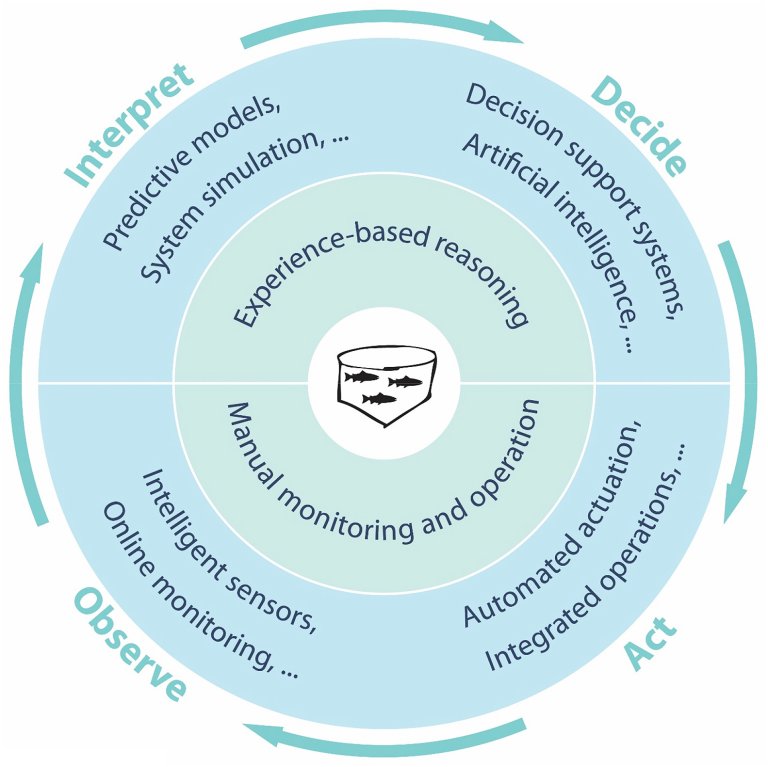The aim of the project is to integrate several data sources from monitoring of fish health, production and behaviour, and use artificial intelligence to improve decision making concerning production and health.
Production of fish in land-based aquaculture contributes significantly to the production of animal protein in the human food-supply chain in the Nordic countries. Recirculation aquaculture systems (RAS) provide an environmentally sustainable solution that is becoming more and more relevant for current production systems. However, considerable challenges with these production systems means narrow production margins and uncertainties regarding fish health and production performance.
An extensive amount of information on water quality, feed use and health parameters are gathered through monitoring of the fish and their environment via sensors. In most cases, these data are stored in separate datasystems, not utilizing the huge potential for more precise monitoring and reporting of the realtime health, welfare and growth of the fish.
We aim to integrate such data from many farms and production cycles and through the usage of Artificial Intelligence (AI), enabling the farmers to move from experience-based to knowledge-based decision making. This will enable a more sustainable production with regards to production margins, environmental impact and fish health and -welfare.
The best indicator of health and performance is the behaviour of the fish themselves. One major challenge in RAS is waste of feed. We will use AI and statistical models to develop a closed loop control of feeding to reduce feed waste and optimize growth, moving from a manual analysis and response to a knowledge-based automatic one. This will be done by the application of deep learning tools on video sequences of fish, teaching computer systems how the fish react when they are hungry and when they have been feed.
In addition, statistical models will be used on the integrated datasources and video sequences to develop a system for early detection and warning of upcoming disease events, thus giving the farmer time to react in the narrow timewindow between an adverse health event and death.
- Aarhus University (Denmark)
- Natural Resources Institute Finland (Finland)
- Oxyguard AS (Denmark)
The IntelliRAS project is funded by the Nordic Research and Innovation Programme for Sustainable Aquaculture under the NordForsk umbrella.
The overarching aim of the Programme is to generate knowledge and solutions for sustainable land-based and marine salmonid aquaculture in the Nordic countries. The Programme also aims to promote Responsible Research and Innovation (RRI) perspectives in sustainable aquaculture within a Nordic context including diversity, inclusion, openness and transparency.
Four crucial and inter-related areas of priority for a joint Nordic research and innovation programme in sustainable salmonid aquaculture are identified.
- Aquaculture microbiome systems
- Aquaculture feeding systems
- Biotechnological advances
- Aquaculture "big data" monitoring and control systems.
TBC
TBC
Precision Fish Farming (PFF)
Is proposed as a means for moving commercial aquaculture from the traditional experience-based to a knowledge-based production regime as illustrated in the figure. The overarching aims of PFF are to:
- improve accuracy, precision and repeatability in farming operations;
- facilitate more autonomous and continuous biomass/animal monitoring;
- provide more reliable decision support and;
- reduce dependencies on manual labour and subjective assessments, and thus improve staff safety.
Through these means, PFF will improve animal health and welfare while increasing the productivity, yield and environmental sustainability in commercial intensive aquaculture. In figure 1 the transition from traditional fish farming to PFF is illustrated, where the inner green circle with ‘experience-based reasoning’ and ‘manual monitoring and operation’ represent the basis for the management decisions taken in traditional fish farming. The outer blue ring, illustrate the tools (models and decision support systems) and equipment (sensors and databases) that is needed to achieve PFF.

The basic principles of Precision Fish Farming (PFF). From Føre et al., 2017.
Most decisions in aquaculture production is taken under some (small or large) degree of uncertainty. Any information that can reduce this uncertainty will be beneficial from a production point of view, because this will lead to a more predictable production result. Information that the farmer is able to attain earlier is also beneficial because it provides an opportunity to react and possibly intervene against the negative effects associated with e.g. disease outbreaks. In traditional fish farming these opportunities are often missed, because the monitoring is too imprecise and/or the changes observed in the fish are too subtle. Thus, adverse factors often only show up in the end end-result of the production: The overall mortality, lower weight gain or inferior slaughter quality.




